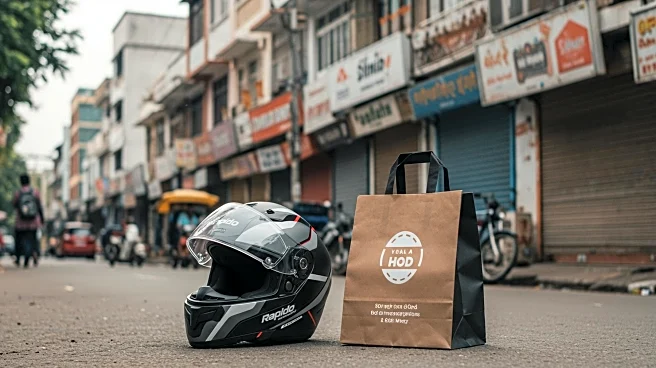What's Happening?
Rapido, an Indian ride-hailing company, has initiated a beta test of its new food delivery service, Ownly, in Bengaluru. This expansion aims to compete with established food delivery giants Swiggy and Zomato. The service is currently operational in select Bengaluru localities, including Byrasandra, Tavarekere, Madiwala, Hosur Sarjapura Road, and Koramangala. Rapido has created a subsidiary, Ctrlx Technologies, to oversee this venture, with co-founder and CEO Aravind Sanka at the helm. Ownly plans to attract restaurants by offering lower prices through a fixed fee per order rather than commissions. Rapido intends to utilize its existing logistics network, comprising 10 million vehicles, to facilitate food deliveries. This move is part of Rapido's broader strategy to diversify its business following successful ventures into bike taxis, auto rickshaws, and cabs.
Why It's Important?
Rapido's entry into the food delivery market signifies a strategic diversification that could disrupt the current dynamics dominated by Swiggy and Zomato. By leveraging its extensive logistics infrastructure, Rapido could offer competitive pricing and efficient delivery services, potentially reshaping consumer preferences and restaurant partnerships. This expansion could lead to increased competition, driving innovation and possibly lowering costs for consumers. Additionally, Rapido's approach of charging a fixed fee per order might appeal to restaurants seeking to reduce commission expenses, thereby altering the economic landscape of food delivery services in India.
What's Next?
As Rapido continues to test its food delivery service, the company may expand its operations to other cities if the Bengaluru trial proves successful. The response from consumers and restaurants will be crucial in determining the service's viability and future growth. Established players like Swiggy and Zomato may need to adapt their strategies to maintain market share, potentially leading to price adjustments or service enhancements. Rapido's expansion could also prompt regulatory scrutiny, especially concerning logistics and pricing models.










